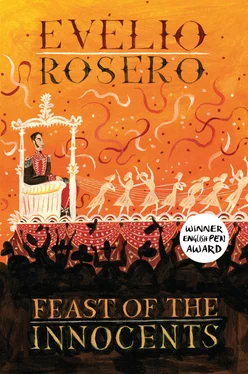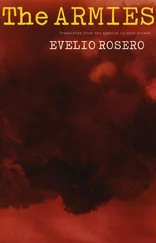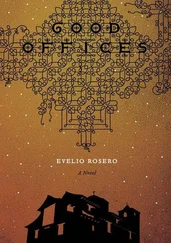Zulia Iscuandé grew exasperated by her husband’s words. She preferred to listen only to the doctor.
“Tell us what you’re suggesting,” she said. And even so it seemed to Tulio Abril that Doctor Justo Pastor Proceso López really had gone mad, or just about: he looked at them without blinking, his hands were shaking.
Now or never, the doctor said to himself again, meanwhile. It was the opportunity of his life. His face was all lit up, as it had been when he made his first communion, when he received his medical degree, when he went to church to marry the woman he was in love with, when he saw her naked, at last. And his face was so full of wonder because he was looking and looking again at the huge figure while he said:
“Furibundo Pita is identical to Simón Bolívar.”
No-one said anything. The children stopped searching for the places where Furibundo’s bullets had left their mark on the float and for the first time attentively regarded the immense figure towering over them, now provided with an alternative identity.
“It’s just like him,” the boy who had been the lookout said at last. “It’s the Liberator himself from the books at school.”
“Simón Bolívar can stay up there just as he is,” the doctor went on. “Furibundo’s wife might come in handy later on, we’ll see how and where; with that terrified expression and fleeing the way she is, she’s like our country.”
No-one seemed to understand, or would admit to understanding, the comparison.
“The only thing up there that can’t be used is the jeep,” the doctor continued, all in a rush. “Luckily, it’s not finished, we’ll transform it. We’ll put a victor’s chariot in its place, a sort of nineteenth-century carriage, where that selfsame Bolívar will go, but in uniform and with a laurel wreath on his head, sitting on his velvet cushion; and the cart will be pulled by twelve girls — I said girls, not young women — with garlands around their hair and skimpy tunics on, like nymphs. That’s how Bolívar liked them.”
He lowered his vision-filled gaze and met the astonished eyes of the artisans for the first time.
“Which Simón Bolívar are you talking about?” Maestro Abril finally asked. “The one from Independence?”
“The very same,” the doctor replied.
It was too late to backtrack now.
But how to explain history in just a single moment and to such an audience?
This carriage the doctor proposed existed just as he described it, in Caracas, on August 6, 1813, when the same people who had celebrated the entry of the Spaniard Monteverde months earlier were now celebrating the entry of Bolívar, giving him a hero’s welcome for accomplishing victories that were not his — the real heroes of those early days had been Piar, Mariño and Girardot — Bolívar’s “victories” were just skirmishes, but the villagers in his path eagerly swelled his ranks, and Bolívar made the most of this and entered Caracas, and he was the one to call himself “the Liberator.”
The Liberator : a title the Caracas city council would later confer on him.
The little fellow had lost no time, the doctor thought. That’s what he used to call Bolívar, when he brooded over him and immersed himself in the man’s historic past as if in a bad dream that became more nightmarish because it was impossible to wake up from.
The little fellow, who ended up betraying General Francisco de Miranda, commander-in-chief of Venezuela’s insurgent forces, personally handing him over to the Spanish in La Guaira, after cunningly persuading him to postpone his journey to England, taking him captive at three in the morning, ordering him to be placed in irons and shackles and offering him up to Monteverde in order to get safe conduct and the approval of the Spanish authorities in exchange; the little fellow who had been the real reason for General Miranda’s fall after abandoning the fortress at Puerto Cabello — the best equipped of the insurgent strongholds — abandoning it despite having more than sufficient forces to thwart a spontaneous uprising by unarmed Spanish prisoners, the little fellow who fled in the night to his San Mateo estate with eight of his officers, without warning his troops who ended up without a leader, let alone any orders to follow; that same little fellow was now received in Caracas as if he were a Napoleon.
Yes, the doctor said to himself, it was the surrender of Puerto Cabello that forced Miranda to sign a treaty that would re-establish Spanish control in Venezuela, and Bolívar was the cause of the defeat: a great deal of shamelessness was required in order for Bolívar to seize Miranda, accusing him of betrayal, the very betrayal that Bolívar did commit by handing his commander over to the Spanish.
No-one will ever be able to understand, he mused, shaking his head in agitation, why they believed in him, how he managed to impose his lie. What to blame this on — ignorance? The uncouthness of the rebel leaders of the day? Why did they send him to negotiate with the English for protection, with such poor results? Why was he named colonel, why was he chosen as commander of the Puerto Cabello fortress? Because of his wealth. Why else? Francisco de Miranda, like any other military leader, gave the buying of arms and munitions and the upkeep of the troops the importance it merited; that was why he had to enrol that bourgeois, who was incompetent by any reckoning, into his army.
And the doctor’s bitter incredulity was sincere: he saw Bolívar as a make-believe strategist, faker of victories that were not victories, or worse — victories that were not his.
He tried, then, not to let his own agitation show in his voice.
“The carriage I’m telling you about,” he explained, “existed, just as I described, one hundred and fifty-three years ago, in Venezuela.”
Once again, an astonished silence surrounded him.
Doctor Proceso was suddenly hit by the hard truth: no-one there knew anything about Bolívar other than the official lies learned at school.
“What do you know about Bolívar?” he dared to ask, and felt his own uncertainty, like a great wall of encircling ice.
“He was the Liberator,” the lookout boy said.
“Father of the nation,” Maestro Abril said, as if adding a full stop; he would not lend himself to mocking Bolívar’s memory.
Doctor Proceso thought his vision — of the Liberator’s carriage — already lay in pieces. It would be superhuman, he thought, to overcome people’s fundamental ignorance of Bolívar’s true face in just one minute. What am I doing here? What am I proposing? Isn’t this futile — more than futile, humiliating?
The artisans withdrew; that morning’s interruptions had been unusual — first a drunk, then a lunatic — best get on with some work. Then they heard Zulia Iscuandé, who had not said a word that whole time.
“My grandfather always talked about Bolívar,” she said.
She half closed her eyes, as if remembering.
“He talked to me about Bolívar,” she said.
And then, resolutely, finding the memory, seizing upon it:
“He was always talking about Bolívar, but he said Bolívar had been a complete son of a bitch.”
The workshop shook with an explosive guffaw. Doctor Justo Pastor Proceso López’s eyes were watering.
My God, he thought, there is still memory among us.
“And not just in Pasto, but right across the country,” Iscuandé continued, spurred on. “Grandfather told us Bolívar was always a complete son of a bitch, wherever he set foot.”
The doctor, who was usually temperate and controlled, asked for a glass of aguardiente , not to celebrate Zulia Iscuandé’s scorn, but her words. That was when Salvador and the rest of the children descended from the float. They had finished checking it over inch by inch.
Читать дальше












